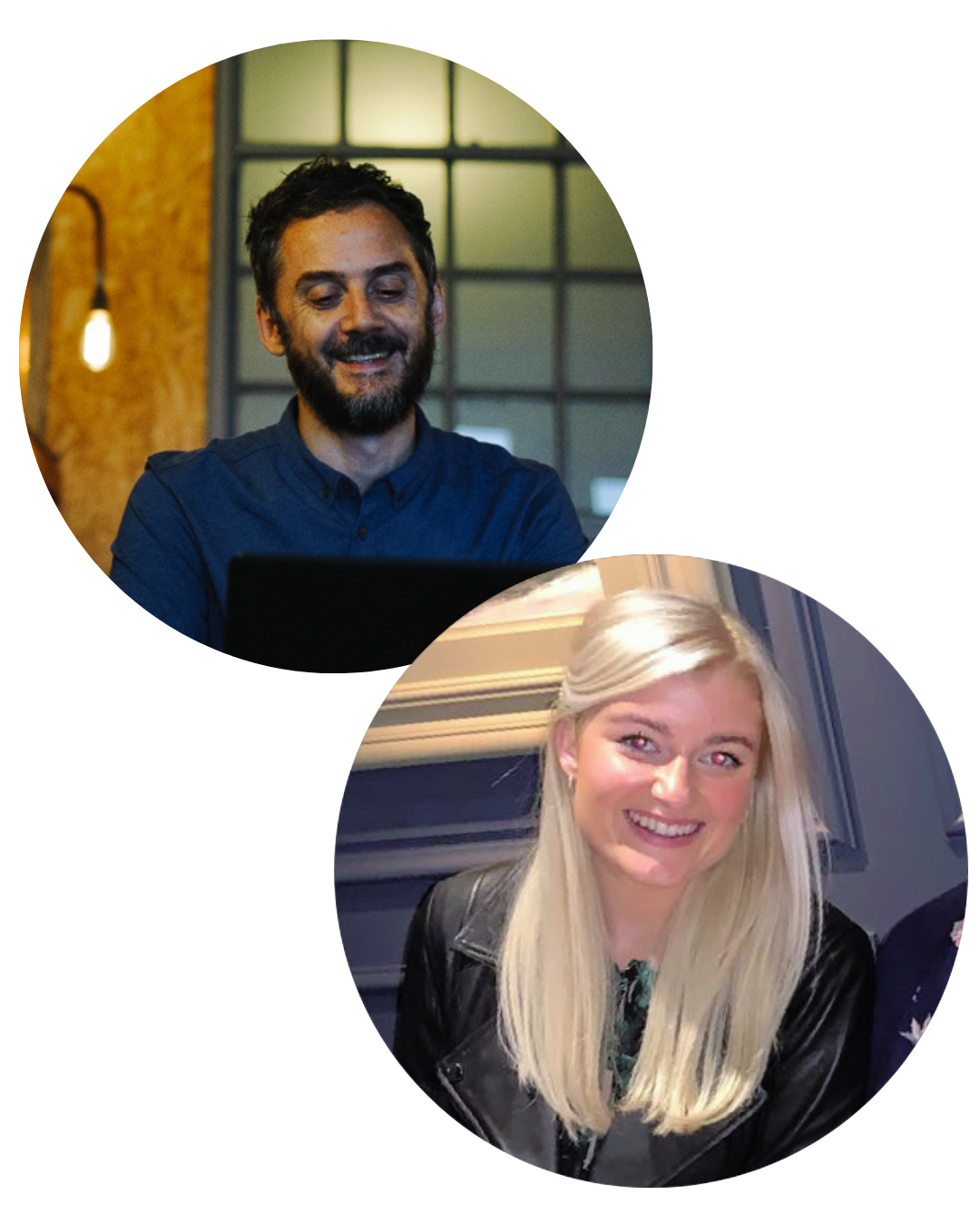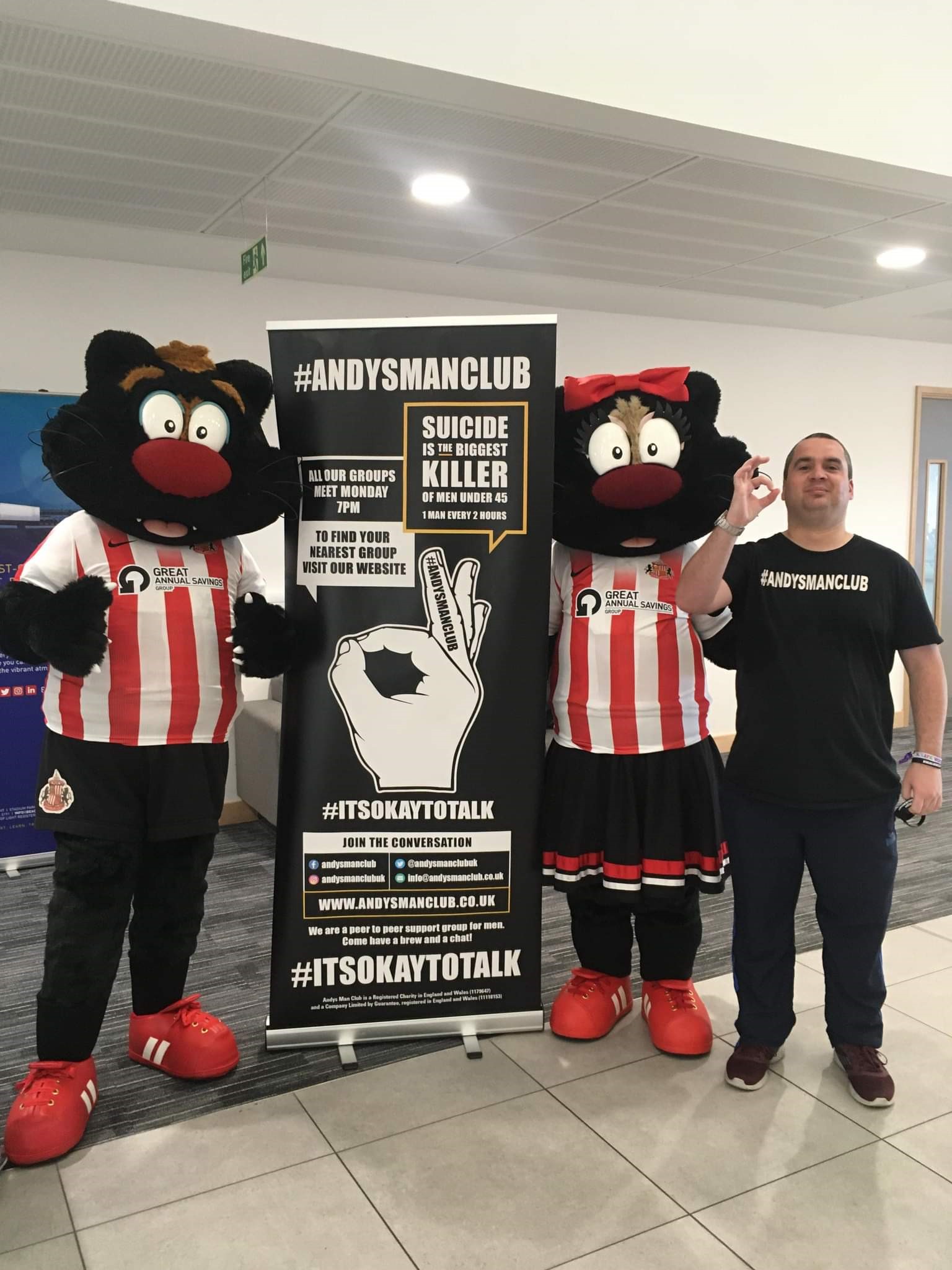Foreword
 by Andy Walton (Community Psychiatric Nurse) and Annabel Sanders (Senior Psychological Wellbeing Practitioner), Service User Involvement Champions
by Andy Walton (Community Psychiatric Nurse) and Annabel Sanders (Senior Psychological Wellbeing Practitioner), Service User Involvement Champions
Welcome to the first edition of SPWS Quarterly, a newsletter shaped by users of the Sunderland Psychological Wellbeing Service (SPWS). It is designed to share lived experience, to help readers maintain a sense of positive mental wellbeing after accessing therapy.
Those who have engaged with our service have demonstrated great strength and honesty in accessing support and making progress with their recovery journey. They represent a community of great ideas, skills and resources. The aim of our newsletter is to share this.
The newsletter is a quarterly reminder to pause, reflect and share progress. Each newsletter will feature four sections, covering different perspectives, stories, resources, events, and courses:
- Let go – Sharing what helps you self-soothe when feeling overwhelmed.
- Do something – Showcasing new activities that have helped people maintain positive wellbeing, and how to get started if you fancy trying them yourself.
- Keep the change – Reflecting on how we maintain positive daily habits, through inspirational stories.
- Updates – Reviews and announcements of new courses, events and resources to support our mental wellbeing.
Often the hardest step of one’s mental health journey is being open about how we are feeling and asking for support. We would like to start our newsletter series with tips on how we can open up to our friends and family about our mental health and begin our recovery journey…
Learning to talk about what’s going on inside your head – and support others to do the same
 Sometimes, a different perspective can change things. We all need time and space to talk about our experiences, to make sense of them. To be listened to—without judgement, assumption and distraction.
Sometimes, a different perspective can change things. We all need time and space to talk about our experiences, to make sense of them. To be listened to—without judgement, assumption and distraction.
Choose an intentional time and environment with a person that can encourage a fresh perspective and not simply repeat short-term assurances.
Talk with people that help you understand experiences in your own way. People who help to facilitate the development of greater self-awareness. People who ask for clarity to understand, and show interest with open questions. People who don’t put pressure on themselves to solve someone else’s problems.
They understand that simply listening can sometimes be enough. Discuss one issue and experience at a time. Break it down. Write it down. And remember to support others as well.
Be aware of your limitations, and if you feel able, ask how you might be helpful, how you could be present for them. This may involve walking alongside them as they discover different avenues, such as formal services, reading materials, or mindful gatherings.
Remember that we each need to find our own answers and need to own the change on our terms.
Acknowledge the strength of showing vulnerability to others and the compassion in supporting others in return. Meaningful and impactful conversations only stem from genuine places.
Open up, and allows others to open around you.
Let go: How the book ‘The Boy, The Mole, The Fox and The Horse’ helps one of our past clients let go of daily stress and reflect on their recovery journey…
 “I have anxiety, which I manage with my CBT techniques. A friend recommended a book to me not as a self-help book but just a reminder we are all on a journey. The book is ‘The Boy, The Mole, The Fox and The Horse’ by Charlie Mackesy.
“I have anxiety, which I manage with my CBT techniques. A friend recommended a book to me not as a self-help book but just a reminder we are all on a journey. The book is ‘The Boy, The Mole, The Fox and The Horse’ by Charlie Mackesy.
“For me, this book makes me feel good and makes me want to be a better person. When reading this book, I could relate to each of the four characters and found a bit of me in each of them. This is the type of book you can read at any time, but also open it at any page just to read a lovely feel-good quote.
“One of my favourite quotes from the book is ‘being kind to yourself is one of the greatest kindnesses.’ This book really makes me remember that life will not always be perfect, and sometimes it will be tough. It’s also a reminder to be kind whenever you can as you never know what battle someone else is facing.”
Do something: ‘How wild swimming helps my mental health’
 “I have always loved the water and always had to put my feet in the sea or paddle in a river. During an intensely difficult time, while I was suffering with severe depression for the first time in my life, I felt compelled to spend as much time outside, near water, as possible. The sound of the water was calming.
“I have always loved the water and always had to put my feet in the sea or paddle in a river. During an intensely difficult time, while I was suffering with severe depression for the first time in my life, I felt compelled to spend as much time outside, near water, as possible. The sound of the water was calming.
“Being outdoors and connecting with nature has a proven, positive impact on my mental wellbeing.
“It takes a number of minutes to fully submerge myself before the pain of the cold water passes. I am not in the water long until I start to swim. I feel like the water demands that I am present in the moment, and I can’t think about anything else, I feel 100% in my body at that moment and no matter what else is going on in my life, I can briefly forget about it, focusing on my swimming technique, the temperature of the water and my breathing. Despite that agonising cold, I discovered that it does me an enormous amount of good. After, I feel a sense of empowerment and achievement.
“It’s an escape from anything that is going on in my life and I am in the moment, alone with my thoughts and feelings. I’m not able to check my phone, not keeping on top of daily tasks and not overthinking. In the water my body is weightless, and I feel detached from what is going on in my life. It forces me out of the state that I feel in, and it puts me solely in the present moment. I feel relaxed and calm and at ease.”
Keep the change: a poem and reflection from a recent client
Heart beating, crushing feeling, can’t stop, switch the thoughts off
A million miles an hour, worry after worry, building up in my head … STOP
Take a breath, slow my pace, remember its not to late
Take it down a notch, ground yourself, find your calming space
You can do this, step out of your head and into the world
Take notice, connect, find enjoyment – you can do this
Thoughts come rushing – taking over -STOP!
You can do this take it back
It takes a while but the calm can take over – focus – breathe – never forget
You’ve got this take control back.
“I wrote this poem as part of my Wellness Recovery Plan, to remind myself of where I was and where I am now. I struggled terribly with my anxiety after a significant and traumatic loss. I was lost in my worries and couldn’t see a way out – everything in my life become entrenched in fear of all the bad things that could happen. My work, family, friendships were all being affected, which only made me feel worse.
“I was able to access the Sunderland Psychological Wellbeing Service, who worked with me and gave me strategies that helped me to gain control over my thoughts and all the anxiety that came with it. I went on to complete some Cognitive Behavioural Therapy (CBT) which further developed the skills I had begun to learn.
“It was the most challenging and difficult process. At times I wanted to give up; give in to the ruminations and thoughts and stay in my ‘safe’ bubble. But it wasn’t ‘safety’, or any way I wanted to live my life.
“I persevered, and with the support of the therapists have found a way to manage the unhelpful thoughts and feelings. My anxiety is now like an annoying friend who won’t go away. It’s helpful at times but has a bit too much to say sometimes!
“Using the strategies I learned in therapy, I finally feel like my life is my own. If I feel myself slipping, I look through my Wellness Recovery Plan and remind myself – you can do this!”
Updates: the power of groups
 Andy’s Man Club
Andy’s Man Club
My name is Michael from Andy’s Man Club Sunderland. I have suffered with social anxiety all my life. My adult life has been filled with a lot of missed opportunities because of a fear of being in large groups or being around people I don’t know. This has resulted in me missing out on events like football matches or friends’ parties. I have also suffered with depression which has led me to have suicidal thoughts and feelings in the past.
I first attended Andy’s Man Club in Hartlepool in May 2019 as a way of trying to overcome my issues. I have had counselling and Cognitive Behavioural Therapy and although these were a positive experience, they did not fully address the problem. Along with passing my driving test, attending Andy’s Man Club is the most beneficial thing I have done in my life. It has enabled me to become more confident in everyday life, I can now socialise with my friends and meet new people. It has also allowed me to become a Sunderland season card holder and enjoy the games without fear of my anxiety ruining the experience. It has also helped me in my work life as it has given me more confidence and passion to try new roles, and take on more duties without worrying I would fail.
Andy’s Man Club began in July 2016, following the tragic suicide of Andy Roberts and was founded by Luke Ambler (Andy’s brother-in-law) and Elaine Roberts (Andy’s mother). It started with one group in Halifax and now has over 60 groups nationwide with over 1000 men attending each week. The benefit of the group far exceeds just that man who walks through the door. It can be a huge relief for family and friends of that one man also.
If any man would like to try this for themselves, please come along to The Beacon of Light, every Monday (except Bank Holidays) at 7pm. It is a place you can talk about your issues/problems in a non-judgemental and confidential environment. No referral is needed, and tea, coffee and biscuits are on us. It is not an easy door to walk through but it could genuinely be the most rewarding door you ever step through.
Always remember, it’s ok to talk.
Groups at Sunderland Psychological Wellbeing Service
It takes strength to be open and display vulnerability in front of others, but the result can be transformative. Raw, open, and honest discussions bring out the bravery in yourself and others, fuelling inspiring and empowering debate and a sense that we can have control over our mental wellbeing.
There is no magic wand to solve mental health issues, but instead a bag of tools that need to be identified, practised, and reflected upon. This idea lends itself to a group approach.
We have a number of groups currently running online for Sunderland residents, which can be accessed by referring into our service via telephone on 0191 566 5454 or visiting www.sunderlandiapt.co.uk.
Groups tend to be weekly, run over 4-6 weeks via online video call. You will need access to the internet to access these groups, and it is helpful if you can use a device with a microphone and webcam. However, there is no pressure to speak or have your camera on if you do not feel comfortable.
Groups are facilitated by staff who are trained in supporting you to manage anxiety, low mood and stress using a range of techniques based on Cognitive Behavioural Therapy (CBT).
Taking control of your mental wellbeing
The ‘Taking Control of Your Mental Wellbeing’ group is facilitated by two Community Psychiatric Nurses (CPNs). This group is focussed on problem-solving, distraction and relaxation techniques for generalised anxiety, depression, and stress. This group is delivered over 6 weeks, and each group session is one hour long.
Other wellbeing groups include:
- Living Life Well
- Improving Sleep
- Living Life Well with Long Covid, Pain and Fatigue.
Online Engagement Group
- The group is for past service users who are keen to share their stories, opinions and ideas about mental health and help to improve our service. It’s your chance to be involved and help us to make services better.
To access our service visit www.sunderlandiapt.co.uk or contact 0191 566 5454
